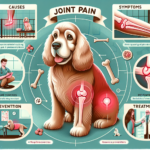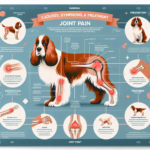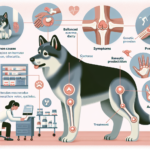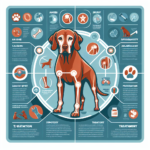Cocker Spaniel Joint Pain: Causes, Symptoms, Prevention, and Treatment

Introduction
The Cocker Spaniel, a beloved breed known for its affectionate nature and distinctive appearance, has a rich history and a set of unique characteristics that make it a favorite among dog enthusiasts. Originating from Spain, the breed was initially developed for hunting purposes, particularly for flushing game birds. Over time, the Cocker Spaniel has evolved into a versatile companion, excelling in both show rings and family homes.
Despite their many endearing qualities, Cocker Spaniels are prone to certain health issues, with joint pain being a significant concern. Joint health is crucial for maintaining the breed’s active and playful lifestyle, making it essential for owners to be aware of the causes, symptoms, prevention, and treatment of joint pain in Cocker Spaniels.
Breed-Specific Joint Pain Risks
Genetic Predisposition
Cocker Spaniels are genetically predisposed to several joint-related issues, including hip dysplasia, arthritis, and elbow dysplasia. Hip dysplasia, a condition where the hip joint doesn’t fit properly into the hip socket, is particularly common in this breed. This genetic predisposition can lead to chronic pain and mobility issues if not addressed early.
Age-Related Risks
As Cocker Spaniels age, the risk of developing joint pain increases. Typically, signs of joint issues may start to appear around the age of 5 to 7 years. However, some dogs may show symptoms earlier, especially if they have a genetic predisposition or have experienced joint stress due to high activity levels.
Activity Level and Joint Stress
Cocker Spaniels are known for their high energy levels and love for physical activities such as running, playing fetch, and participating in agility sports. While regular exercise is essential for their overall health, excessive or high-impact activities can put stress on their joints, potentially leading to joint pain and other related issues.
Common Symptoms of Joint Pain in Cocker Spaniels
General Symptoms
- Limping or favoring one leg
- Stiffness, especially after rest or sleep
- Reluctance to jump, run, or climb stairs
- Decreased activity or playfulness
- Swelling around the joints
- Whining or showing signs of discomfort when touched
Breed-Specific Symptoms
In Cocker Spaniels, joint pain may manifest more noticeably in their hind legs due to their predisposition to hip dysplasia. Owners may observe a “bunny hopping” gait or a reluctance to engage in activities that require hind leg strength, such as jumping onto furniture.
When to Consult a Vet
If you notice any of the above symptoms in your Cocker Spaniel, it is crucial to consult a veterinarian promptly. Early diagnosis and intervention can significantly improve the quality of life for your dog and prevent further joint deterioration.
Preventive Measures for Joint Health
Exercise Recommendations
Regular, low-impact exercise is vital for maintaining joint health in Cocker Spaniels. Activities such as swimming, walking on soft surfaces, and controlled play sessions can help keep their joints flexible and muscles strong without causing excessive stress. Avoid high-impact activities like jumping or running on hard surfaces.
Dietary Suggestions
A balanced diet rich in essential nutrients can support joint health. Consider incorporating foods or supplements that contain glucosamine, chondroitin, and omega-3 fatty acids, which are known to promote joint health and reduce inflammation. Consult your veterinarian for specific dietary recommendations tailored to your dog’s needs.
Weight Management
Maintaining a healthy weight is crucial for reducing joint stress in Cocker Spaniels. Obesity can exacerbate joint pain and lead to other health issues. Monitor your dog’s weight regularly and adjust their diet and exercise routine as needed to ensure they stay within a healthy weight range.
Early Screening and Monitoring
Regular veterinary check-ups and early screening for joint issues can help catch problems before they become severe. Your veterinarian may recommend X-rays or other diagnostic tests to assess joint health, especially if your dog is genetically predisposed to joint conditions.
Treatment Options for Joint Pain
Non-Surgical Treatments
Non-surgical treatments for joint pain in Cocker Spaniels include medications such as nonsteroidal anti-inflammatory drugs (NSAIDs) to reduce pain and inflammation. Physical therapy, including exercises and massage, can also help improve joint function and mobility. Additionally, lifestyle adjustments such as providing a comfortable resting area and avoiding high-impact activities can alleviate joint pain.
Surgical Options
In severe cases, surgical intervention may be necessary to address joint pain. Common surgical options include hip replacement, arthroscopy, and joint fusion. These procedures can significantly improve the quality of life for dogs with advanced joint issues, but they require careful consideration and consultation with a veterinary specialist.
Alternative Therapies
Alternative treatments such as acupuncture, hydrotherapy, and chiropractic care can also benefit Cocker Spaniels with joint pain. These therapies can help reduce pain, improve mobility, and enhance overall well-being. Always consult your veterinarian before starting any alternative treatment to ensure it is safe and appropriate for your dog.
Lifestyle and Management Tips
Daily Care Routine
A consistent daily care routine can help manage and alleviate joint pain in Cocker Spaniels. This routine may include gentle exercise, a balanced diet, regular grooming, and providing a comfortable resting area. Monitoring your dog’s behavior and adjusting their routine as needed can also help manage joint pain effectively.
Modifying the Home Environment
Making simple modifications to your home can make a significant difference for a dog suffering from joint pain. Consider using ramps instead of stairs, providing orthopedic beds for better joint support, and ensuring that food and water bowls are at a comfortable height to reduce strain on the joints.
Long-Term Management
Long-term management of joint pain involves regular veterinary check-ups, ongoing monitoring of your dog’s condition, and making necessary adjustments to their care routine. Keeping your dog active and engaged with low-impact activities can help maintain their quality of life despite joint pain.
FAQs About Cocker Spaniels and Joint Pain
What are the early signs of joint pain in Cocker Spaniels?
Early signs of joint pain in Cocker Spaniels include limping, stiffness, reluctance to move, and decreased activity levels. If you notice any of these symptoms, consult your veterinarian for a thorough evaluation.
Can joint pain in Cocker Spaniels be prevented?
While genetic predisposition cannot be entirely prevented, maintaining a healthy weight, providing regular low-impact exercise, and ensuring a balanced diet can help reduce the risk of joint pain in Cocker Spaniels.
Are there specific foods that can help with joint health?
Yes, foods rich in glucosamine, chondroitin, and omega-3 fatty acids can support joint health. Consult your veterinarian for specific dietary recommendations tailored to your dog’s needs.
When should I consider surgery for my dog’s joint pain?
Surgery should be considered when non-surgical treatments are no longer effective, and your dog’s quality of life is significantly impacted by joint pain. Consult a veterinary specialist to discuss the best surgical options for your dog.
What alternative therapies are effective for joint pain in Cocker Spaniels?
Alternative therapies such as acupuncture, hydrotherapy, and chiropractic care can be effective in managing joint pain. Always consult your veterinarian before starting any alternative treatment to ensure it is safe and appropriate for your dog.
Conclusion
Joint pain is a common concern for Cocker Spaniels, but with proper awareness and proactive care, it can be managed effectively. By understanding the causes, symptoms, prevention, and treatment options, owners can ensure their Cocker Spaniels lead happy, active lives. Regular veterinary check-ups, a balanced diet, appropriate exercise, and a supportive home environment are key to maintaining joint health in this beloved breed. Always consult your veterinarian for personalized advice and treatment plans to keep your Cocker Spaniel’s joints healthy and pain-free.




